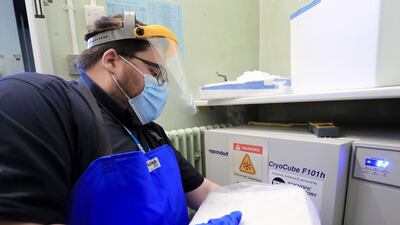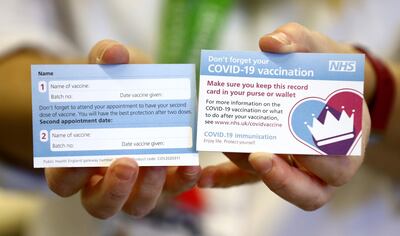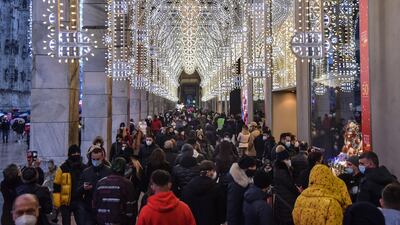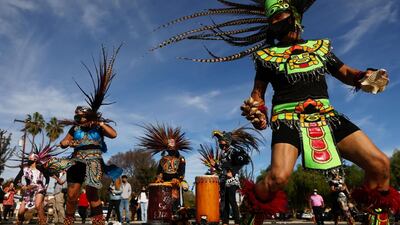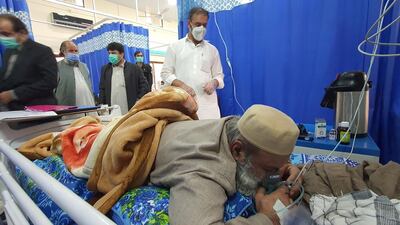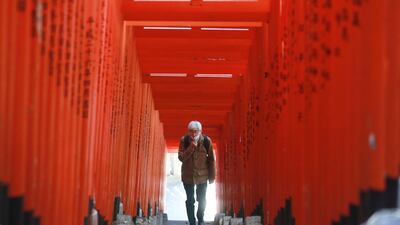The UK is nearing the start of the biggest immunisation campaign in its history.
The world's first rollout of the Pifzer-BioNTech vaccine will begin on Tuesday – an occasion Health Secretary Matt Hancock called V-Day.
The rollout comes as the threat of a no-deal Brexit increases by the hour with Britain and the EU struggling to strike a new trade deal.
The deadlock could threaten the supply of the vaccine because the nearest Pfizer manufacturing plant to the UK is in Belgium. The government reportedly has military flights on standby in case negotiations collapse and new rules cause border chaos from January 1.
Asked whether the armed forces would be used to help transport the vaccine to the UK, Foreign Office minister James Cleverly told BBC Breakfast: "Potentially – we are looking at non-commercial flight options."
Mr Cleverly also confirmed Britons would be handed a Covid-19 vaccination card to show they have been inoculated against the disease. The confirmation comes a week after the government denied that the cards would be required to gain entry to restaurants and bars.
There are fears some businesses may give preferential treatment to customers who have received a vaccine.
Tory MPs have previously criticised vaccine passports as "coercion" and a restriction of civil liberties.
Pressed on whether the cards were in fact a passport, Mr Cleverly told Sky News: “It’s about unlocking people’s lives, it’s about unlocking the economy, it’s about making sure we protect lives and protect livelihoods.”
First in line to receive the vaccine are people aged 80 and over, care home workers and frontline staff in the NHS, who are considered at higher risk. The government also wants to prioritise elderly residents in care homes but is running into technical challenges in administering doses away from hospitals, given the need for ultra-low storage temperatures.
A special network of GPs and pharmacists will begin vaccinating patients from December 14. The government expects that the majority of vulnerable people will be vaccinated in January and February.
Meanwhile, a leading scientist said on Monday that the country could experience a “severe peak” of infections in January if social distancing was ignored. Prof Andrew Hayward of University College London said he was concerned about scenes of crowded high streets and shopping centres.
He told BBC Radio 4's Today programme: "We still have the winter to get through, which is likely to be the time that is most favourable for Covid transmission.
“We could still see a very severe peak, particularly in January, when I predict that would be most likely if we take our foot off the pedal on this. And that would be so sad considering we’re going to be in a stage where we can protect the most vulnerable during December, January, February and start to get back to normal in late spring, early summer.”
At Croydon hospital at the weekend, a lab technician lifted a package of doses out of dry ice in a box storing the vaccine at minus 70°C, and transferred the batch to a special freezer.
"To know that they are here, and we are among the first in the country to actually receive the vaccine and therefore the first in the world, is just amazing, I'm so proud," said Louise Coughlan, joint chief pharmacist at the Croydon hospital trust.
The Pfizer-BioNTech vaccine will be administered in two doses, three weeks apart. Britain's initial batch will cover 400,000 people, and the government has another 40 million doses ordered. It hopes for many more from other drug companies, including a leading candidate from the Oxford University-AstraZeneca partnership still being evaluated.
Approval for the Pfizer-BioNTech vaccine is expected later this month in the US and EU.
National Health Service medical director Stephen Powis said Britain's rollout would be a "marathon not a sprint", with the government sequencing priority groups by age and health condition. The vaccine is not expected to reach younger groups until spring or summer 2021.
"Despite the huge complexities, hospitals will kick-start the first phase of the largest-scale vaccination campaign in our country's history from Tuesday," Dr Powis said. "Hardworking staff will once again rise to the challenge to protect the most vulnerable people from this awful disease."
The Queen, 94, and Prince Philip, 99, are reportedly in line to receive the shot early in the rollout because of their age. Britain's most senior royals will also convey to the public that they have been given the inoculations "as a powerful counter to the anti-vaccination movement", The Times reported.
Monty Python star Michael Palin, 77, campaigning singer Bob Geldof, 69, and 73-year-old Ronnie Wood of The Rolling Stones also committed publicly to getting the vaccine in a drive to boost take-up.
A YouGov poll of more than 5,300 people published last Wednesday indicated 27 per cent of people were "very confident" about the safety of the Pfizer-BioNTech vaccine; 43 per cent were "somewhat confident"; 11 per cent "not very confident"; and 9 per cent "not confident at all".
Just under half (44 per cent) opposed compulsory vaccination, while more than a third (37 per cent) backed the idea.
